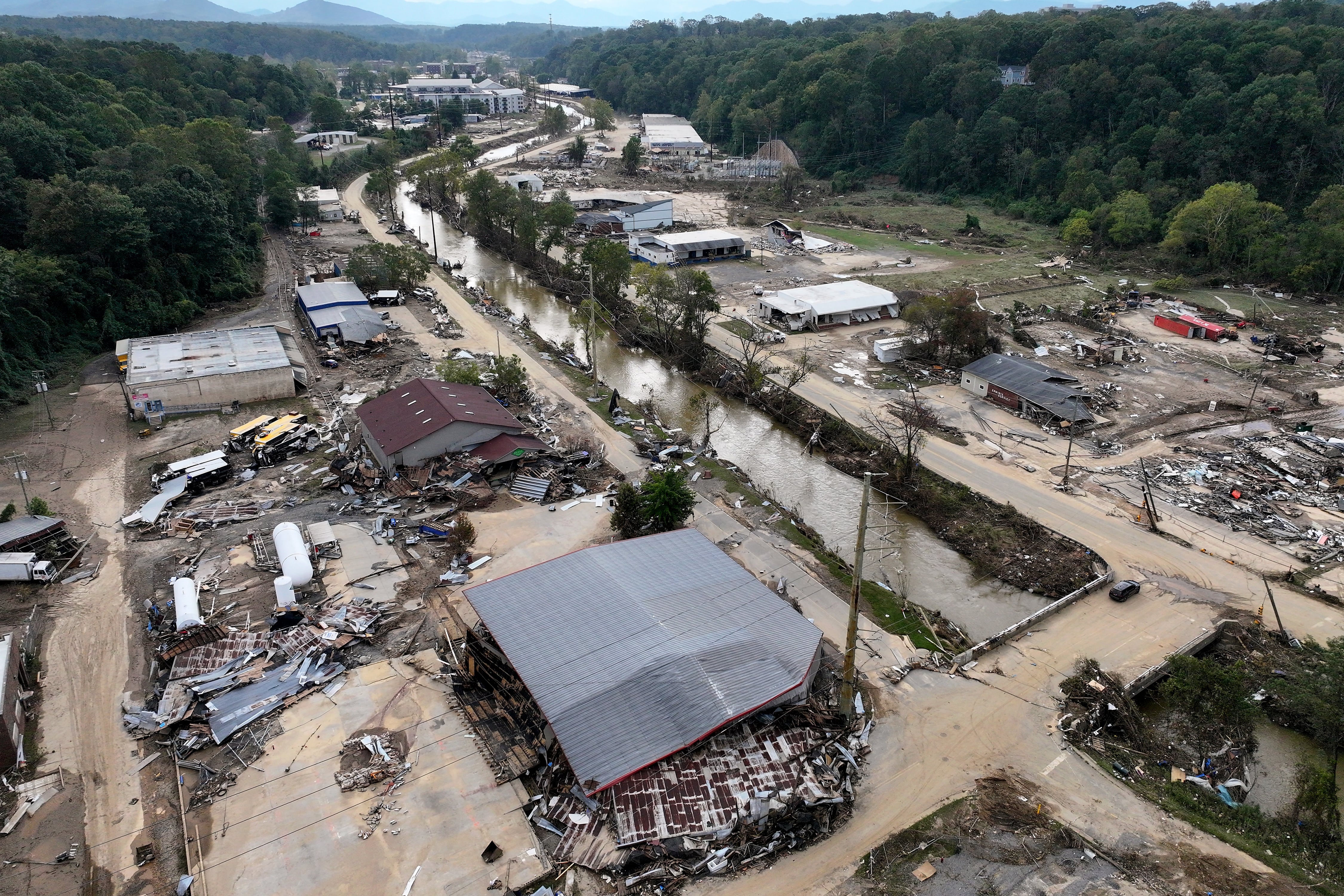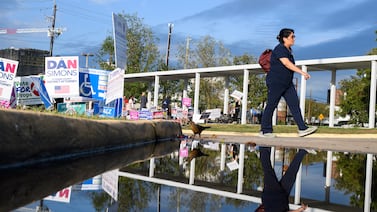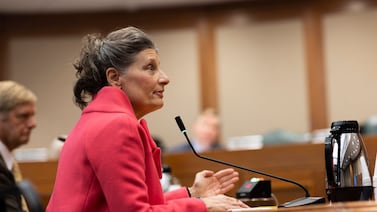Votebeat is a nonprofit news organization reporting on voting access and election administration across the U.S.
This news analysis was originally distributed in Votebeat’s free weekly newsletter. Sign up to get future editions, including the latest reporting from Votebeat bureaus and curated news from other publications, delivered to your inbox every Saturday.
The death toll from Hurricane Helene continues to climb in the mountain towns of western North Carolina. Emergency workers airlifted aid to hollows and hamlets cut off from roads half-swallowed by the storm. People without electricity, cellular service, or internet chainsawed through fallen trees and debris, searching for loved ones. Many won’t be able to return to their homes.
These people probably weren’t thinking about elections. But state and local election officials were. With Election Day barely a month away — and mail ballots about to go out — they had no choice.
On Monday and Tuesday, Karen Brinson Bell, executive director of the North Carolina State Board of Elections, said her office had been in touch with election staff around the region. Many were themselves without water, power, or Internet, and contending with impassable roads and damage to their homes. One worker who went to check on the Buncombe County elections office made the trip on foot, a distance she estimated at about 4 miles.
For all the devastation in these communities, somehow, the 2024 election must go on. “We can’t stop elections,” Bell said during a press call Tuesday.
As of Tuesday, Bell said the state board had confirmed that voting equipment, ballots, and ballot paper stock had apparently made it through the storm. The next step, she said, will be to get every county elections office open and operating; around a dozen in the 25 counties covered by the federal disaster declaration were still closed at the time of the call (the state board is tracking their status here, on a new website set up to help voters after the storm). The state has provided emergency kits to counties that requested them, including Watauga, Mitchell, and Haywood, each with clean laptops, cellphones, and devices to help them securely connect to the Internet.
Among the questions election officials were confronting last week: which early voting sites and polling places across the region will still be usable, and which ones are too damaged by mudslides or falling trees, or simply inaccessible by road; whether some polling locations must be merged, even if that means residents will have to travel farther to reach them; whether election workers who had planned to staff those sites can still report for duty; and how to respond to disruptions to mail delivery, which was suspended through much of the area.
“We do not have all the answers right now,” Bell acknowledged, “but we are diligently working to figure them out.”
State officials were also working through different scenarios that could require the elections board to use emergency powers, or seek special action from the state legislature, such as more funding or a grace period for absentee ballots that arrive after Election Day, something lawmakers previously eliminated.
The state’s election officials have coped with disasters before. After Hurricane Dorian in 2019, Bell reminded reporters, the National Guard helped them set up voting in a tent in Hyde County. This time, state election officials are reminding voters that lost or damaged absentee ballots can be reissued and sent to temporary addresses, and the state’s voter identification law includes an exception for victims of a natural disaster occurring within 100 days of Election Day (see other tips for voting after Helene in North Carolina here).
But no matter how diligently election officials work, the aftermath of a natural disaster has the potential to confuse voters and upset typical voting patterns.
It can also set long-term shifts in motion by reshaping the region’s electorate, displacing residents, and scattering college students.
In heavily flooded Asheville, officials said it could take weeks to restore water service. UNC-Asheville, Bell’s alma mater, said it had evacuated students and would not resume classes until at least Oct. 28. Smaller towns like Chimney Rock, a tourism magnet near Lake Lure, were reduced to fields of debris and splintered wood, and emergency workers had limited ability to reach the most remote and isolated communities.
The decisions election officials make in the next few days will carry great weight in this swing state, which is critical to Republicans’ White House strategy and where Democrats are hoping for a breakthrough. North Carolina “is a state that’s going to be decided at the margins,” said Christopher Cooper, a professor of political science at Western Carolina University, which has also suspended classes.
Trump won the state by around 75,000 votes in 2020, and carried most of the counties in western North Carolina. Buncombe County, which includes Asheville, and Watauga County, home to Appalachian State University, were islands of blue. The North Carolina counties included in the federal disaster declaration include roughly 17% of the state’s registered voters, including 1 in 5 five Republicans and about 1 in 8 Democrats.
Officials in Florida, Georgia, Virginia, South Carolina, and Tennessee were also assessing damage from Helene. In Georgia, state officials also said no election buildings were compromised, though counties are still assessing damage to polling locations and roads. There, too, equipment and ballot paper appear to have been spared.
While power is out in several counties, the Georgia Emergency Management Service estimates that it will be back well in time for the start of early voting. Still, the lack of power and internet is affecting military and overseas voters, whose ballot requests cannot be processed.
Gabriel Sterling, chief operating officer for the Georgia Secretary of State’s Office, said the biggest concern is the U.S. Postal Service. “We have a list of ZIP codes where they just aren’t delivering right now, and we have to get absentee ballots out” in just over a week, he said. Sterling said that the state is working out a contingency plan for having ballots delivered by UPS or FedEx. “We aren’t there yet,” he said, “but we are getting everything lined up in case we have to pull the trigger.”
In Tennessee, Doug Kufner, communications director for Secretary of State Tre Hargett, said in an email that at least six Election Day polling locations in northeast Tennessee “have experienced damage or currently have driving accessibility issues because of bridge or road damage.” That number could rise as the damage is still being evaluated, he said. Two county election offices also sustained water damage.
Election officials are resilient and will overcome the challenges, he stressed, but “the heartache, shock, and devastation are massive.”
In Florida, election officials are surveying damage and working with USPS, said Mark Ard, a spokesman for the Florida Secretary of State’s Office. Mark Earley, the supervisor of elections in Leon County, which was in Helene’s path but didn’t see as much severe damage as some other areas, said election officials are still assessing needs. There may be time to make repairs to at least some damaged polling places, for example, he said.
Earley, a former head of the state elections supervisors association, said Florida state and local election officials have a history of working well together to determine, for example, what should be included in an executive order addressing election needs after a natural disaster. Gov. Ron DeSantis issued such an order Thursday, giving election officials in 10 affected counties flexibility to make changes to voting sites, as well as some other requirements.
Such events demand flexibility, Earley said. For example, he delayed sending mail ballots to county residents until after the storm had passed, hoping to avoid having them damaged en route, or somehow lost.
Beyond that, he said, election officials have to “stay strong” and make sure emergency management officials are aware of their needs.
He said concerns about life and limb take priority. “But certainly,” he added, “elections are critical infrastructure.”
Editorial Director Jessica Huseman contributed. Carrie Levine is Votebeat’s managing editor and is based in Washington, D.C. She edits and frequently writes Votebeat’s national newsletter. Contact Carrie at clevine@votebeat.org.




